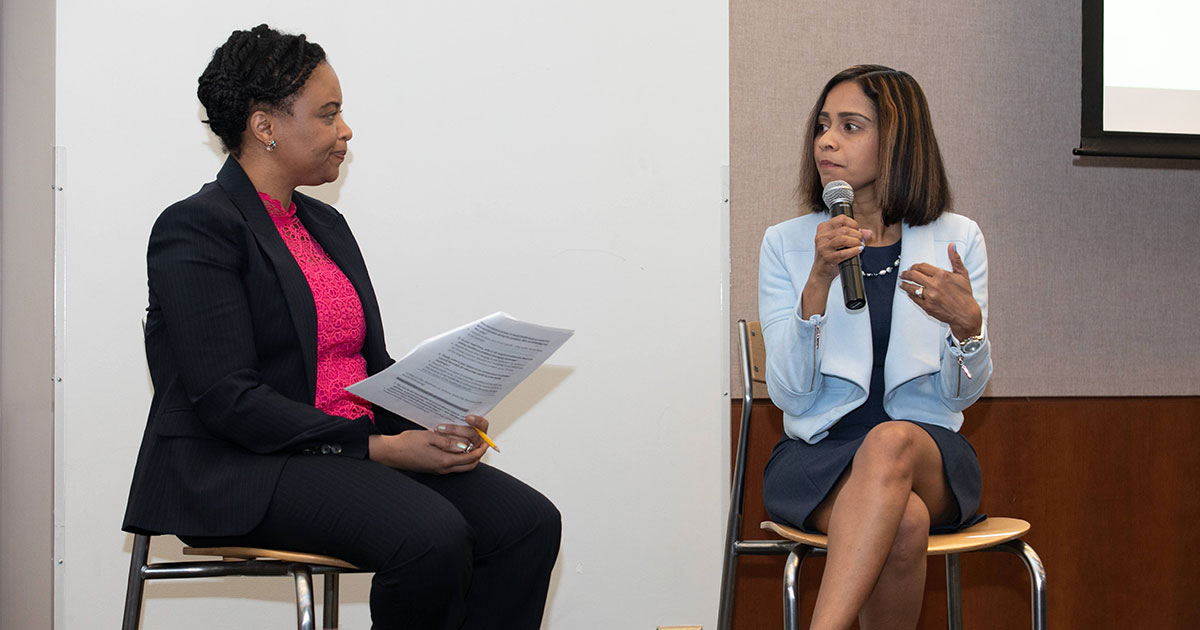Babson Brings Entrepreneurship and Innovation to Health

Reaching the aims set out in the Sustainable Development Goals won’t be easy.
Those 17 goals, adopted by the United Nations in 2015, serve as a call to action for the planet and the people who inhabit it. The goals are big and ambitious, and the third goal, the one that focuses on health, is no exception.
That third goal boldly declares: Ensure healthy lives and promote well-being for all at all ages.
In this time of pandemic, with COVID-19 laying bare health disparities that exist around the world, that all-encompassing goal can seem like wishful thinking. Just look at how so many people in poor communities and countries don’t have access to the COVID-19 vaccine.
“COVID exposed inequities both here and around the world,” says Wiljeana Jackson Glover, the Stephen C. and Carmella R. Kletjian Foundation Distinguished Professor of Health Innovation and Entrepreneurship at Babson College.
While COVID-19 exposed inequity, however, it also accelerated innovation. Consider telemedicine, which bloomed during the pandemic, allowing many patients in lockdown the chance to still see their doctors. “There are so many more digital health solutions because of COVID,” Glover says. “It has caused an increase in digital health innovation.”
This moment in health care and life sciences, marked by disparity and inequality, but also opportunity and technology, is made for Babson’s Kerry Murphy Healey Center for Health Innovation and Entrepreneurship. Founded in 2019, but recently given a new name and a renewed focus, the KMH Center aims to tap into the power of entrepreneurship and innovation to create health, economic, and social value for all, with a concentration on health equity and justice.
“It is the time for this. The health sector is 20 percent of the GDP. It is a sector that requires business acumen and a new way of approaching.”
Wiljeana Jackson Glover, founding faculty director of the Kerry Murphy Healey Center for Health Innovation and Entrepreneurship
“We will be entrepreneurial. We will act. We will go where the need is,” says Cheryl Kiser, interim executive director of the KMH Center, as well as the executive director of Babson’s Institute for Social Innovation. “We really want to focus on innovation and entrepreneurship. That’s what Babson does.”
There is much work for the KMH Center to do, and much opportunity. By 2030, according to the USAID’s Center for Innovation and Impact, achieving the health aspirations outlined in the U.N.’s Sustainable Development Goals could become increasingly more difficult, as a staggering $371 billion annual investment gap is projected to exist by then. Private investment, together with innovation and entrepreneurship, can help to close this gap.
“It is the time for this,” says Glover, the KMH Center’s founding faculty director. “The health sector is 20 percent of the GDP. It is a sector that requires business acumen and a new way of approaching. People have said that health care is broken. We can move beyond saying the system is broken and instead experiment with new ideas in a way that is beneficial for all.”
A Broader Reach
Established thanks to generous support from Carmella Kletjian, who had the foresight to see the impact that the entrepreneurial mindset can have on medicine, the KMH Center was initially known as the Kerry Murphy Healey Center for Global Healthcare Entrepreneurship.
The name change reflects a broader reach for the KMH Center. Previously, it focused more on the delivery of medical services, such as bringing medicine and surgical care to underprivileged places. “We now want to extend our reach beyond service, to all parts of the health sector,” Glover says. That means looking at drug development, medical devices, digital health innovation, and processes for care.
Extending its reach enables the KMH Center to more fully include Babson alumni in its work, tapping into their wide-ranging experiences and connections. More than 1,400 Beavers are employed in all facets of the healthcare sector. “They are making significant differences in the industry,” Glover says.
“We will be entrepreneurial. We will act. We will go where the need is. We really want to focus on innovation and entrepreneurship. That’s what Babson does.”
Cheryl Kiser, interim executive director of the Kerry Murphy Healey Center for Health Innovation and Entrepreneurship
KMH Center activities fall into three main categories: research (KMH Center faculty currently conduct research in health innovation and entrepreneurship, health equity, and health analytics); advanced education (the KMH Center offers customizable short courses and certificate programs targeted toward healthcare leaders); and experiential learning (a flagship KMH Center program, The Global Health Innovation Lab, pairs Babson students with those from Rwanda’s University of Global Health Equity to work with health organizations in the country).
In everything it does, the KMH Center will be thinking of equity. “Every program we run, there is always a pause where we think about, ‘Will this be inclusive?’ ” Glover says. “We are thinking about how it will impact all patients, all people. This will be central to what we do.”
Entrepreneurial Leadership
Health care may be a massive, complicated industry, but the KMH Center plans to demonstrate how entrepreneurial leadership can make a difference there. “It is one of the most powerful mindsets for addressing complex needs,” Kiser says.
Glover agrees. “The KMH Center shows Babson’s commitment to challenging social issues,” she says, “and showing how we can be entrepreneurial leaders in these spaces.”
That’s a strong message to send to students. “Health care is a huge business. This is a great area for Babson students to apply their entrepreneurial mindset and skills,” Kiser says. “Health care is a future opportunity for our students to make an impact.”
Posted in Community




